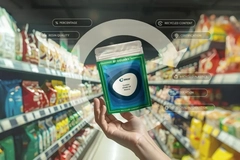Global bioplastics production set to triple amid packaging innovation and new agricultural demand
07 Mar 2023 --- The worldwide production of bioplastics is expected to almost triple over the coming four years from 2.2 million metric tons in 2022, according to estimations made by European Bioplastics.
Aimplas held the eighth edition of its International Seminar on Biopolymers and Sustainable Composites in Valencia, Spain, last week, where speakers highlighted globally increasing bioplastic production and discussed the challenges and opportunities currently facing the bioplastics industry.
The Plastics Technology Centre Aimplas aims to support companies with applying circular economy criteria to their business models and turn the legislative changes that affect the plastics industry into opportunities to improve company efficiency, reduce environmental impact and increase profitability.

“The forecast [for bioplastics production] is set to triple and reach 6.3 million metric tons by 2027. The applications that are expected to grow the most are those related to agriculture, which will increase from 4% to 5% of total production,” an Aimplas spokesperson tells PackagingInsights.
In 2022, packaging remained the biggest market segment for bioplastics (48% by weight).
Agriculture concerns
At the seminar, European Commission (EC) representative Theodora Nikolakopoulou highlighted Europe’s concern for protecting farmland and said that from July 2026, all controlled-action fertilizers marketed in the EU will be mandatory biodegradable.
Elena Domínguez, an agricultural researcher at Aimplas and technical coordinator of the seminar, explained how the company is advising the EC about the criteria that these kinds of applications should meet in order to guarantee their status as biodegradable products.
.jpg) Speakers at the Aimplas seminar highlighted globally increasing bioplastic production.Furthermore, Jordi Simón, from the Spanish packaging association Asobiocom, described compostable applications and highlighted the importance of restricting their use to applications where bioplastics contribute value, maintain product functionality and provide end-of-life-related benefits by improving sustainability and reducing environmental impact.
Speakers at the Aimplas seminar highlighted globally increasing bioplastic production.Furthermore, Jordi Simón, from the Spanish packaging association Asobiocom, described compostable applications and highlighted the importance of restricting their use to applications where bioplastics contribute value, maintain product functionality and provide end-of-life-related benefits by improving sustainability and reducing environmental impact.
Innova Market Insights pegged “Renewable rebellion” as a top packaging trend for this year. According to the market researcher, F&B product launches that feature either a biodegradable or compostable claim have almost tripled since 2018, with categories such as tea, coffee and confectionery accounting for nearly half of these launches.
Ensuring biodegradation
The renewable packaging trend looks set to continue amid growing consumer support. Only 6% of global consumers perceive bioplastics as unsustainable.
The second block of the seminar, discussing standardizations and certifications, was moderated by Johana Andrade, a researcher at the Aimplas Biodegradability and Composting Laboratory and technical coordinator of the seminar.
Andrade highlighted the importance of standardizations and certifications when communicating the advantages of bioplastics to ensure that they are used appropriately and that their end-of-life is managed properly and the anticipated environmental benefits are obtained.
Aimplas says that positive results of compostable plastics in real composting cases at industrial plants were presented, where it was verified that complete biodegradation took place and quality compost was obtained with a reduction in unidentified waste.
Material innovations
Companies along the entire value chain demonstrated their innovations in materials and products at the seminar. Participants gained firsthand knowledge about innovations like additives that improve biopolymer processability and compatibility to water bottles made of recycled polylactic acid that have the same properties and quality as virgin material.
Companies also demonstrated pyrotechnic devices for air shows made of bioplastic by blown-film extrusion and a whole range of compostable containers, closures and bottles that can be processed by conventional machinery and have the same properties as traditional plastics.
Meanwhile, Aimplas presented the results of some of its projects for the packaging industry, such as biodegradable barrier packaging from food waste, plastic film obtained from coffee waste, active packaging to extend the shelf life of cheese made from cheese industry waste and cartridges for 3D food printing.
For the agricultural sector, Aimplas showcased natural paints to control citrus mealybug infestations in the field and foams for hydroponic crops made from poultry industry feather waste, as well as a compostable cardboard-like product made from the waste from pruning and pressing the vine crop.
Earlier this year, Aimplas converted used coffee grounds into plastic film. The group said the project is another step toward circularizing the European economy by turning biological waste into resources – one of the main objectives of the European WaysTUP! project financed by the Horizon H2020 program.
By Natalie Schwertheim













